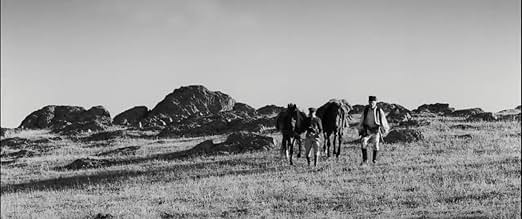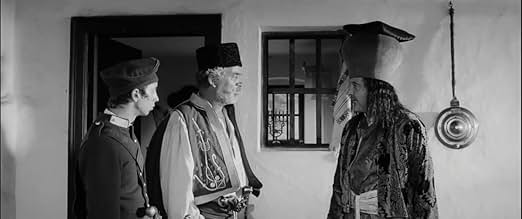अपनी भाषा में प्लॉट जोड़ेंSet in early 19th century Romania, a policeman, Costandin, is hired by a nobleman to find a Gypsy slave who has run away from his estate after having an affair with his wife.Set in early 19th century Romania, a policeman, Costandin, is hired by a nobleman to find a Gypsy slave who has run away from his estate after having an affair with his wife.Set in early 19th century Romania, a policeman, Costandin, is hired by a nobleman to find a Gypsy slave who has run away from his estate after having an affair with his wife.
- पुरस्कार
- 23 जीत और कुल 7 नामांकन
फ़ीचर्ड समीक्षाएं
"Aferim!" is an Ottoman Turkish expression meaning "bravo!," a word used with deep irony in the film but one that can equally be directed, without any irony, at the director. A great deal of the freshness lies in the way Jude dispenses with traditional historical-film trappings even while cleaving to the classic structure of fugitive-hunting Westerns.There's nothing staid or prettified here, and while a significant amount of background research is on show, the helmer uses it to re-create an atmosphere rather than a specific, sacrosanct event.
Folks who know the history of Romanian cinema and remember some of the films made decades back will recognize elements of atmosphere and quotes. The 'Eastern' genre which took the structure of the classical American Westerns bringing on screen local characters or even changing the landscape to the fields, forests and mountains of the Romanian countries was popular in the 70s with the 'Haidouk' series but also in the works of Dan Pita (the 'Ardelenii' series). The inspired black and white cinematography credited to Marius Panduru and the very conventional generic that opens the film brought in mind the even older 'Tudor' by Lucian Bratu made in 1962 which dealt with events that took place 14 years before the year 1835 when 'Aferim!' is situated. The violently naturalistic nature of some of the scenes has also its roots in the Romanian literature (Liviu Rebreanu's novels) which were also brought to screen.
Yet, this film aims more. The story of the local sheriff (let us use this name for the sake of the international audience) and of his son searching for a fugitive gypsy in the forest and swamps of Wallachia is not just a road movie or an initiation story from the perspective of the young lad destined to inherit the profession of his father. It is a deep and cruel reflection of the prevailing attitude not only of the ruling class but of the whole or great majority of the population of Romania towards other nationalities. The story and the characters come in a frontal manner against deeply rooted stereotypes like the welcoming attitude of Romanians towards strangers or the positive role of the Orthodox church in the moral fiber and education of the masses. It is actually a priest who speaks on screen a tirade full of prejudice against all categories of strangers living or getting in contact with the Romanian at that time - Gypsies of course, but also Jews, Turks, Russians, etc. Folks less familiar with the history of Romania should know that by 1835 Romania was still broken into smaller countries under Turkish, Austrian and Russian rulers - so what is seen on screen has a historical perspective. It is however the relation with the present that comes in mind immediately for those who know history and present. Romania as other East European countries have a big social and ethnic problem with the lack of integration of part of their Roma (gypsy) minorities. The roots of this situation lay to a great extent to the slavery practiced on this minority until mid 19th century. Slavery was abolished (in 1855-1856) but prejudices stay.
The merit of Radu Jude is to avoid any excuse or sweetening of the historical facts, while telling a coherent story and creating characters who are not only credible but also memorable. He carefully builds the atmosphere, habits, language of the time in a well documented manner. He is helped by a fine team of actors - Teodor Corban and Mihai Comanoiu as the father and son, Toma Cuzin as the fugitive (would have deserved maybe more screen time to give more complexity to his character), and Alexandru Dabija as the cruel but credible landlord. Two of the best actors of Romania from the older generation Victor Rebengiuc and Luminita Gheorghiu appear in short roles, which shows that even important artists were interested to be part of this cinematographic experience. I feel that 'Aferim!' is a film that was much talked about since its release, and will be even more talked about in the future.
Beautifully shot from a necessary distance by Marius Panduru in black and white, the movie smoothly fades in and out of images, thoughts, prejudices and superstitions characteristic of a society marked by poverty, corruption, racism, xenophobia, misogyny, and religious intolerance. Things of the past, one might say, things of the past.
Teodor Corban gives Constandin determination, humor and a certain kindness, mainly directed toward Ionita (a well-cast Mihai Comanoiu) and rarely toward the gypsy slave Carfin (Toma Cuzin, in a convincing role). Mihale Sirbu and her tormented character Sultana skillfully navigate the dangerous waters of passion and fear, especially in the menacing presence of boyar Iordache (Alexandru Dabija). In a deceptively easy role, Alexandru Bindea portrays a Priest who summarizes the mentalities of the time.
So, is "Aferim!" a masterpiece? Unfortunately, although it comes so close, is not. Shot in only 23 days (according to an interview given by Radu Jude) the movie appears to be assembled in a hurry. The verbal and physical violence is overwhelming. After seeing the movie, go home and hide all scissors! Radu Jude decided that cruelty is the legacy of that era and should also be the mark of his movie. He placed the most violent scene at the very end to shock the audiences and festival juries, with vastly different results. Should that scene had been placed earlier, the mark of the movie could have been the donquixotesque father and son horseback trip across Wallachia in search of the meaning of life. Too bad that instead of a masterpiece we got a master and a piece.
Along the way the two men come across many more Roma – whom they refer to as 'Crows' (because crows are black) and treat them like the underclass they believe them to be. They also run into a number of other – less than savoury – characters including the World's most xenophobic Priest. What follows is story that can be seen as comedic, harrowing and at times almost bewildering in its depiction of what times were like. The enslavement of the Roma is a subject rarely mentioned and so this is groundbreaking in many ways.
It is filmed in black and white and is lit in such a way to make this seem many years older than it is, Director Radu Jude said this is a western and did a lot to evoke the early westerns in theme and composure of the story, but he has also created a film that is unique too. There is violence here and scenes that some may find upsetting but it is just an amazing watch. Languages are Romanian, Turkish and Roma with OK sub titles to be fair. The title 'Aferim' means 'bravo' in Turkish and as the Romanians hated the Ottoman Empire it is ironic that they use this word as a form of praise – but that is intentional. Nominated for the 88th Academy Award for Best Foreign Language film I feel this is in with rather a big chance and is a film that I can absolutely recommend to all World cinema fans.
क्या आपको पता है
- ट्रिविया"Aferim!" is an Ottoman Turkish expression meaning "Bravo!".
- गूफ़When she talks with Constandin, Smaranda calls him Carfin once.
- भाव
The Priest: Each nation has its purpose. The Jews, to cheat, the Turks, to do harm, us Romanians to love and suffer like Christ. And each has their habits. Hebrews reads a lot, Greeks talks a lot, Turks has many wives, Arabs has many teeth, Germans smokes a lot, Hungarians eats a lot, Russians drinks a lot, English thinks a lot, French likes fashion a lot, Armenians are lazy, Circassians wears much lace, Italians lies a lot, Serbians cheats a lot, Gypsies get beaten! Gypsies must be slaves.
- कनेक्शनFeatured in Bir Sigmund Weinberg belge-meseli (2020)
- साउंडट्रैकTipto tiptis
Original music composed by Antonie Pantoleon-Petroveanu (as Anton Pann)
Performed by Florin Iordan, Marian Cleante (violin), Sandu Constantin (vocals), Gheorghe Falcaru (whistle)
टॉप पसंद
- How long is Aferim!?Alexa द्वारा संचालित
विवरण
- रिलीज़ की तारीख़
- कंट्री ऑफ़ ओरिजिन
- आधिकारिक साइट
- भाषाएं
- इस रूप में भी जाना जाता है
- 追拿吉普賽!
- फ़िल्माने की जगहें
- उत्पादन कंपनियां
- IMDbPro पर और कंपनी क्रेडिट देखें
बॉक्स ऑफ़िस
- बजट
- €12,50,000(अनुमानित)
- US और कनाडा में सकल
- $1,08,110
- US और कनाडा में पहले सप्ताह में कुल कमाई
- $15,892
- 24 जन॰ 2016
- दुनिया भर में सकल
- $3,50,110
- चलने की अवधि1 घंटा 48 मिनट
- रंग
- पक्ष अनुपात
- 2.35 : 1
इस पेज में योगदान दें





























